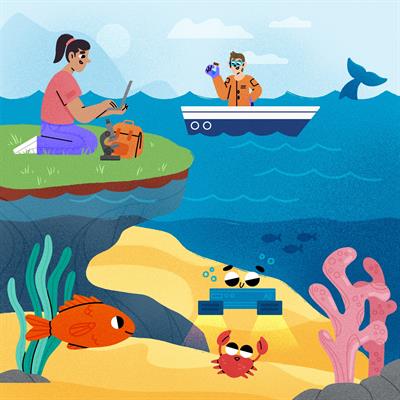
The Ocean, Volume 6
Collection Editors
Hervé Claustre, Carolyn Scheurle, Laura Lorenzoni, Emily KingViews
10,589 viewsParticipating Sections
Abstract Submission Deadline
31.03.2025
Submission Deadline
17.06.2025
Extended Deadline
12.08.2025
Articles

Biodiversity
03/02/2026
Killer Cone Snails: Deadly Predators or the...
Authors
Antonio Caballero Foncubierta, Juan Carlos García Galindo...
Biodiversity
12/11/2025
Using Math to Protect Fish in the Ocean
Authors
Maria Grazia Pennino, Francisco Izquierdo, Marta...
Earth Sciences
16/05/2025
Deep-Sea Tales From a Hawaiian Marine Protected...
Authors
Martina GagliotiAbout this collection
The ocean is where life on Earth began billions of years ago. It continues to support all living beings today and will remain essential for our future. Vast, deep, and often harsh, the ocean still holds many secrets—much of it remains unexplored and not yet fully understood.Scientists need to study the ocean to better grasp how it functions, what its properties are, and how it shapes our environment and influences our lives.
For example, do you know what the role of the ocean is on weather and climate? There also remains so much to explore and investigate as diverse oceanic resources (fish stocks, bio-molecules, renewable energies but also minerals, oil and gas…). And, as we use these ocean resources, how can we do so responsibly and sustainably? And how can we minimize our impacts (such as pollution, acidification, and deoxygenation) as the human population continues to grow?
In this Frontiers for Young Minds Collection, ocean scientists from diverse disciplines share recent discoveries and fundamental concepts. They offer insights into their knowledge, explain what drives their curiosity and describe the innovative tools and methods (including for example robotics and artificial intelligence) that help them uncover the mysteries of our ocean. The Collection highlights a large range of oceanic environments from the open ocean to the shores, and from the surface to the abysses.
It also explores specific areas such as coral reefs and examines the ocean’s many connections at its interfaces (atmosphere, ice, and land). Topics range from physics and chemistry to biology, genomics, biodiversity, ecology, economics, conservation, and marine policy. The Collection also embraces different scales of time and space—from daily rhythms to geological eras, from local systems to global patterns, and from the tiniest cells to the biggest living animals on our planet.
The United Nations has declared 2021-2030 the “Decade of Ocean Science for Sustainable Development”, stressing the urgent need to approach fundamental issues related to the ocean and the future of humanity on well sounded scientific grounds and knowledge. In this context, The Ocean Collection aims to provide information to young readers that will help them to increase their understanding of the ocean and of its central role in nature and our lives. By sharing scientific knowledge and fostering curiosity, we hope to empower informed choices, and an engagement to protect and study the ocean, and enjoy its richness.
Would you like to submit to this collection?
For researchers interested in submitting to this Collection, please consult our author guidelines and check that you have all the essentials included before submitting









